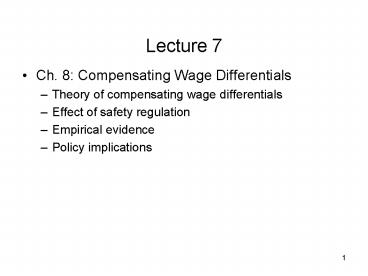Ch' 8: Compensating Wage Differentials - PowerPoint PPT Presentation
1 / 31
Title:
Ch' 8: Compensating Wage Differentials
Description:
What job attributes (besides high pay) do people like? ... far as I have been able to observe, make up for a small pecuniary gain in some ... – PowerPoint PPT presentation
Number of Views:53
Avg rating:3.0/5.0
Title: Ch' 8: Compensating Wage Differentials
1
Lecture 7
- Ch. 8 Compensating Wage Differentials
- Theory of compensating wage differentials
- Effect of safety regulation
- Empirical evidence
- Policy implications
2
Wage distribution
Wage Rate ()
Probability distribution
WU
WE
Supply
WL
Demand
NE
NH
NL
Number of Workers
3
Compensating wage differentials
- What job attributes (besides low pay) do people
dislike? - What job attributes (besides high pay) do people
like? - Were you compensated for the poor working
conditions? - If yes, said to have received a compensating wage
differential.
4
Compensating wage differentials (contd)
- Conditions necessary for existence of CWD.
- Alternative job opportunities exist
- Mobility between jobs
- Perfect information
- Your dislike of the job attribute isnt unique
5
Heterogeneous preferences
Income per day ()
UB
Slope -WRB
UA
Slope -WRA
T
Leisure (hours/day)
6
Heterogeneous preferences (contd)
Wage
Supply
RB
RA
1
2
Number of Workers
7
Compensating wage differential (contd)
Relative Wage (WB/WA)
W1
SupplyB
Compensating Wage Differential
W0 1
DemandB
N1
Employment in occupation B
8
Compensating wage differential (contd)
Relative Wage (WB/WA)
Supply1
W2
W0 1
D2
D1
N1
N2
Number of Workers
9
Compensating Wage Differentials (contd)
- Compensating wage differentials have serve three
socially desirable purposes - Long history in economic thought
- The five following are the principal
circumstances which, so far as I have been able
to observe, make up for a small pecuniary gain in
some employments, and counter-balance a great on
in others first, the agreeableness or
disagreeableness of the employments themselves
secondly, the easiness and cheapness, or the
difficulty and expense of learning them thirdly
the constancy or inconstancy of employment in
them fourthly, the small or great trust which
must be reposed in those who exercise them and
fifthly, the probability or improbability of
success in them.
10
Wage differentials for dangerous work
- Compensating risk premium
- Why analyze this type of wage differential
- Development and insights of model
11
One Persons Indifference Curves
Wage
Utility2
Utility1
C
B
WB
A
WA
RA
RB
Risk of injury
12
Indifference Curves of Two People
Wage
UtilityA
UtilityB
E
W2A
W2B
F
D
W1
R1
R2
Risk of injury
13
One Persons Indifference Curves
Wage
Utility2
Utility1
Safety
14
Indifference Curves of 2 people
Wage
W2A
W2B
W1
Utility B
UtilityA
S1
S2
Safety
15
Isoprofit schedules
- What do isoprofit schedules depict?
- Why negative tradeoff between safety and wages?
- How does tradeoff change with increasing amount
of safety?
16
Isoprofit Schedules for One Firm
Wage
A
B
IHIGH
ILOW
Safety
17
Isoprofit Schedules for 2 firms
Wage
W1
W2B
W2A
I Firm A
I Firm B
S1
S2
Safety
18
Isoprofit Schedules (contd)
Wage
WA1
WB1
W1
I Firm A
I Firm B
SB1
SA1
S1
Safety
19
Equilibrium One worker one firm
Wage
W1
U 1
I1
Safety
S1
20
Equilibrium 2 firms and 2 workers
Wage
W2
UB
UA
W1
S1
S2
Safety
21
Safety regulation Effect on worker
Wage
WC
U1
Wr
U2
I1
Safety
SC
Sr
22
Safety regulation Effect on firm
Wage
I2
I1
WC
Wr
U1
Safety
SC
Sr
23
Rationale for Safety Regulation
- Information is not perfect
- Worker mobility may not exist
- Worker does not bear all the cost of an accident
- Social opinion
- Workers may prefer a safer environment
24
Empirical Evidence
- Compensating risk premiums
- How to determine if compensating wage
differentials actually exist? - Gunderson and Hyatt (2001)
25
Empirical Evidence (contd)
Injuries by Selected Industry in Canada, 1998
Source Human Resources Development Canada (2000)
26
Empirical Evidence (contd)
- Gunderson and Hyatt (2001) (contd)
- Used multivariate regression.
- Wage f (risk of death, risk of injury, age,
education, work experience, union membership,
occupation, firm size, region) - How do risk or death and risk of injury affect
wages? - Findings
27
Empirical Evidence (contd)
- Hatton and Williamson (1991)
- What is relationship between jobs with high risk
of unemployment and wages? - Looked at data on unskilled labourers from
Michigan in the 1890s - Found strong evidence of compensating wage
differentials - Implications
28
Empirical Evidence (contd)
Source www.jobquality.ca (part of www.cprn.org)
29
Empirical Evidence (contd)
Source www.jobquality.ca (part of www.cprn.org)
30
Empirical Evidence (contd)
Source Frank, 1996
31
Empirical Evidence (contd)
Source www.jobquality.ca (part of www.cprn.org)































